#한국말
안녕하세요 여러분! Today I have a new kind of lesson for you all: it’s about Hanja! If you don’t know what Hanja is, it’s “Chinese characters borrowed from Chinese and incorporated into the Korean language with Korean pronunciation,” according to Korean Wiki Project. Korean words that feature the same borrowed character often have a shared meaning of some sort, which is why Hanja is good to know! If you know the meaning of one word with a character, you might be able to figure out another word with the same character without even using a dictionary!
To start this series of lessons, I wanted to start with the character 최; I got an ask about some words starting with it and thought it’d be helpful to make a short lesson about it :) I’m also going to post this on my Instagram soon as well, so go check it out there too! Let’s start!

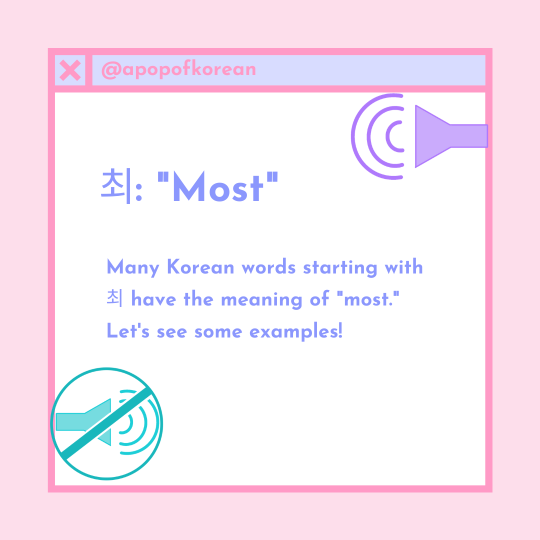


I hope this short list of words has been helpful – let me know what you think and if you’d like to see more of these! Maybe in the future I can break down the entire word – instead of just explaining what 최 means, for instance, I can explain what 애 means too, for example. Lmk your thought! See you in the next lesson! 다음에 또 봐요!
- My masterlist
- Joinmy Discord chat here to practice Korean with others!
- Follow me onInstagram herefor more Korean content!
- GetDrops Premium usingmy affiliate link to expand your Korean vocab!
- Check out myKo-Fi to support this blog and my studies! Thank you for your generosity!
안녕하세요 여러분! Hey everyone! Today I have a lesson with a grammar structure you hear pretty often and it yet another way to say “because” in Korean lol. I also made a post on my Instagram about this structure, so go check that out as well! Let’s start!
Here’s the formula for this structure:
- [verb stem] + 느라고 + [rest of sentence]
- Note that this can only be used with verbs, not adjectives.
- I believe the -고 can be dropped with no difference in meaning.
-느라고 is used to explain a reason for a consequence, and this consequence is usually negative. It can also be used in contexts when your doing one action prevents you from doing the other. Let’s look at some examples:
- 공부하느라고 밤 새웠어요. = I stayed up all night studying.
- Here, you’re explaining what caused you to stay up all night, which was studying.
- 숙제를 하느라고 파티에 못 갔어요. = I couldn’t go to the party because I was busy doing homework.
- The consequence of your doing homework is not not being able to go to the party. One action, doing homework, prevented you from doing the other, which is going to the party.
Let’s see some more examples!
- 늦잠을 자느라고 수업에 못 갔어요. = I didn’t go to class because I overslept.
- 운동하느라고 전화를 못 받았어요. = I was exercising, so I couldn’t pick up your phone call.
- 일하느라고 바빴어요. = I was busy working.
- 요리하느라고 힘들었어요. = I was exhausted after cooking.
- 야근하느라고 집에 늦게 왔어요. = I came home late because I was working overtime.
That’s about it for this lesson! Hope it was helpful! See you in the next one! 다음에 또 봐요!
- My masterlist
- Joinmy Discord chat here to practice Korean with others!
- Follow me onInstagram herefor more Korean content!
- GetDrops Premium usingmy affiliate link to expand your Korean vocab!
- Check out myKo-Fi to support this blog and my studies! Thank you for your generosity!
안녕하세요 여러분! I have another Insta post I wanted to share with y’all! I have a regular lesson about -(으)면 되다 and -(으)면 안 되다 that I made a while back, but I feel like this post is a little more accurate and captures its nuance better. So that’s why I’m posting it here too! I hope it’s helpful!
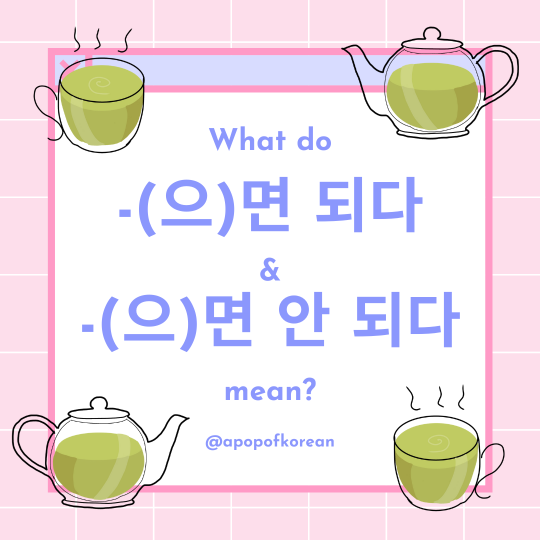


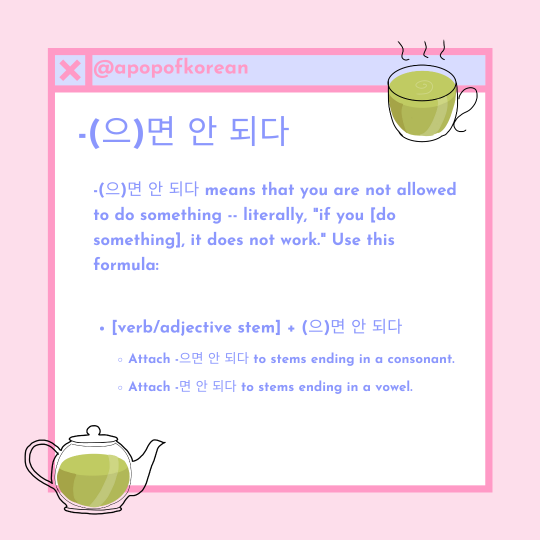

Don’t forget to follow me on Instagram by clicking the link below! Hope this is helpful :) See you in the next lesson! 다음에 또 봐요!
- My masterlist
- Joinmy Discord chat here to practice Korean with others!
- Follow me onInstagram herefor more Korean content!
- GetDrops Premium usingmy affiliate link to expand your Korean vocab!
- Check out myKo-Fi to support this blog and my studies! Thank you for your generosity!
안녕하세요 여러분! Hey everyone! I got a request for a vocab list about K-pop fandom-related words, so here it is! This is a combination of words you might use as a fan and some words related to being an idol. I hope it’s helpful :) Let’s start!
Nouns
- 가사 = lyrics
- 가수 = singer
- 그룹 = group
- (메인, 리드) 댄서 = (main, lead) dancer
- 리더 = leader
- (메인, 리드) 래퍼 = rapper
- 막내 = the youngest member of a group
- (메인, 리드) 보컬 = vocal
- 노래 = song
- 뮤직비디오 = music video
- 뮤비 is short for this.
- 멤버 = member
- 비주얼 = visual
- 밴드 = band
- 안무 = choreography
- 안무 연습 = dance practice
- 아이돌 = idol
- 연습생 = trainee
- 응원봉 = lightstick
- 인터뷰 = interview
- 앨범 = album
- (제일) 좋아하는 멤버 = bias
- 제일 좋아하는 멤버 literally means “favorite member” or “member you like the most.” I often just see 좋아하는 멤버 to mean the same thing, even though it literally means “member that you like.”
- 컴백 = comeback
- 콘서트 = concert
- 콘서트티켓 = concert ticket
- 케이팝 = K-pop
- 포토카드 / 포카 = photocard
- 팬 = fan
- 팬사인회 = fan signing event
- 팬클럽 = fan club
Verbs
- 덕질하다 = to be a die-hard fan of; to be really into
- 노래하다 = to sing
- 노래를 부르다 is another word for “to sing”
- 데뷔하다 = to debut
- 녹음하다 = to record
- 연습하다 = to practice
- 응원하다 = to cheer on; to support
- 촬영하다 = to shoot; to film
- 춤을추다 = to dance
- 컴백하다 = to have a comeback
That’s about it for this list! 제일 좋아하는 밴드가 뭐예요? 코멘트 하세요! What is your favorite band? Leave a comment! See you in the next lesson! 다음에 또 봐요!
- My masterlist
- Joinmy Discord chat here to practice Korean with others!
- Follow me onInstagram herefor more Korean content!
- GetDrops Premium usingmy affiliate link to expand your Korean vocab!
- Check out myKo-Fi to support this blog and my studies! Thank you for your generosity!
안녕하세요 여러분! I got a request to do some possible questions and answers that you might come across if you’re auditioning to be a K-pop idol! I’m not entirely familiar with the audition process or what kinds of questions might be asked of you, but here’s a list based on what I found online. I think that in order to answer these questions in Korean, you should be familiar with beginner/upper-beginner and some intermediate grammar structures and vocabulary. Check out my masterlist linked below to find some lessons that might help you answer them! I hope this is helpful for any aspiring idols! Let’s start!
Questions / 질문
- 이름이 뭐예요? = What is your name?
- 어디에서 왔어요? = Where are you from?
- 어디에 살아요? = Where do you live?
- 몇 살이세요? = How old are you?
- 학교에 어디 다녀요? = Where do you go to school?
- 학교에 어디 다녔어요? = Where did you go to school?
- 무슨 언어를 하세요? = What languages do you speak?
- 노래한 지 얼마나 됐어요? = How long have you been singing for?
- 춤을 춘 지 얼마나 됐어요? = How long have you been dancing for?
- 랩을 한 지 얼마나 됐어요? = How long have you been rapping for?
- 무슨 악기를 하세요? = What instruments do you play?
- 왜 아이돌 되고 싶으세요? = Why do you want to be an idol?
- 가장 좋아하는 가수/밴드 누구예요? = Who is your favorite singer/band?
- 취미가 뭐예요? = What are your hobbies?
Answers / 대답
- 안녕하세요, 제 이름은 [name]입니다. = Hello, my name is [name].
- 저는 [country]에서 왔어요. / 저는 [country] 사람입니다. = I am from [country].
- 저는 [place]에 살고 있습니다. = I live in [place].
- 저는 [#]살입니다. = I am [#] years old.
- Use native Korean numbers when saying your age.
- 저는 [school’s name]에 다녀요. = I go to [school’s name].
- 저는 [school’s name]에 다녔어요. = I went to [school’s name].
- 저는 [language 1], [language 2]하고 [language 3] 합니다. = I speak [language 1], [language 2], and [language 3].
- 저는 노래한 지 [amount of time] 됐어요. = I have been singing for [amount of time].
- 저는 춤을 춘 지 [amount of time] 됐습니다. = I have been dancing for [amount of time].
- 저는 랩을 한 지 [amount of time] 됐습니다. = I have been rapping for [amount of time].
- 저는 [year]년부터 노래했습니다 / 춤을 췄습니다 / 랩을 했습니다. = I have been singing/dancing/rapping since [year].
- 저는 [instrument] 연주합니다. = I play [instrument].
- [reason] 아이돌 되고 싶습니다. = I want to become an idol because [reason].
- 가장 좋아하는 가수는/그룹은 [name]입니다. = My favorite singer/group is [name].
- 제 취미는 [hobby]하고 [hobby] 입니다. = My hobbies are [hobby] and [hobby].
That’s about it for this list! Best of luck to you all :) See you in the next lesson! 다음에 또 봐요!
- My masterlist
- Joinmy Discord chat here to practice Korean with others!
- Follow me onInstagram herefor more Korean content!
- GetDrops Premium usingmy affiliate link to expand your Korean vocab!
- Check out myKo-Fito support this blog and my studies! Thank you for your generosity!
안녕하세요 여러분! Hey everyone! I got another request for a K-pop breakdown, so here it is! This one was pretty tricky for me to break down, but I hope it all makes sense anyways! If you have a song you’d like to see me break down, let me know and I’ll try to fulfill it!
You can listen to this song here! I used lyricstranslate.com’s really good translations and Naver Dictionary to help me out. As usual, I linked my full-length lessons about the grammar structures mentioned if you want to learn more about them! Let’s start!

휘하고 멋지게 솟구치는 눈은 / 이별에 손짓인 듯 부서지는 / 밤으로 가득한 고요를 본다
The snow that soars up majestically with a whoosh / Sees the silence full of night / That is shattered by our goodbye as if it were a gesture
- 휘하다 -> I can’t find a related translation for this word on Naver Dictionary, but just going off the translations from lyricstranslate, it means “with a whoosh.”
- 멋지다 can mean anything from “nice” to “awesome” to “charming.”
- [adjective stem] + 게 turns that adjective into an adverb.
- -고is attached to stems to mean “and.” So 휘하고 멋지게 means “with a whoosh and majestically.”
- 솟구치다 = soar; gush; surge
- 눈 = snow
- [verb] + 는 + [noun] = [noun] that [verbs] -> This is how you describe nouns with verbs in the present tense.
- -은 is a topic particle that shows that 눈 is the topic of the sentence. More about particles here!
- 이별 = farewell; goodbye
- 에 = is a location particle meaning “to” or “in.” In this context, however, it means “by,” as in “shattered by.”
- 손짓 = hand gesture
- [noun] + 인듯 = as if it is [noun]
- 부서지다 = break; be broken; be shattered
- 밤 = night
- 가득하다 = full [of smth]
- -(으)로 in this context means “with” or “of,” as in “filled with night” or “full of night.”
- 고요 = silence
- 보다 = to see
- [verb stem] + ㄴ/는다 or [adjective stem] + 다 is known as the plain style or narrative form. This type of speech doesn’t really have a formality level. You see it a lot in books and newspapers where there’s not really a specific formality level you’re using. It can also be used with those who you would speak informally to.
돌아보는 여운이 안타깝다 / 숨을 쉰다 눈이 온다 / 인사한다 잠이 든다
The afterglow is full of regret / Breathing, snowing / Greeting, falling asleep
- 돌아보다 = to look back
- 여운 = resonance; lingering feeling; echo
- I think 돌아보는 여운 literally means “the resonance I looked back on” or something like that.
- 안타깝다 = regrettable; sad
- 숨을 쉬다 = to breathe
- 눈이 오다 = to snow (literally “snow comes”)
- 인사하다 = to greet
- 잠이 들다 = to fall asleep
- When conjugated into the plain style, the ㄹ gets dropped and replaced with -ㄴ다 because it’s irregular.
떠나간다 / 떠나간다 / 남은 것은 이제 없다
Leaving / Leaving / Now there’s nothing left
- 떠나가다 = to leave
- 남다 = to remain; to be left
- 남은 것 = what’s left; the things that remain
- 이제 = now
- 없다 = to not be there; to not exist; to not have
그대가 웃는 걸 보면서 나도 웃는다 / 발자국에 아쉬움 꾹 묻어둔 채로
As I look at you smile, I smile too / Burying my regret in my footprints
- 그대 = You -> this is a more romantic way of saying “you” that you would say to your partner.
- 웃다 = to smile; to laugh
- 웃는 걸 refers to the fact that you’re smiling. The action of you smiling is turned into a noun, and that is what the speaker is looking at.
- [verb stem] + (으)면서 means “as one [does verb]” and is used for when two actions are done simultaneously.
- 나 = I (informal)
- -도 = too
- 발자국 = footprints
- 아쉽다 = be a shame; be a pity
- 아쉬움 is the noun form of 아쉽다 courtesy of -ㅁ nominalization.
- 꾹 = firmly; completely
- 묻어두다 = hide; bury; conceal
- -ㄴ 채로 describes the state that something is in as an action is being done. In this case, the speaker is smiling with her heart buried – her heart is in the state of being buried as she is smiling.
That’s all for this breakdown – I hope it was helpful! See you in the next lesson! 다음에 또 봐요!
- My masterlist
- Joinmy Discord chat here to practice Korean with others!
- Follow me onInstagram herefor more Korean content!
- GetDrops Premium usingmy affiliate linkto expand your Korean vocab!
- Check out myKo-Fi to support this blog and my studies! Thank you for your generosity!
안녕하세요! Hello again everyone! I have yet another breakdown that was requested! If there’s a song you want to see broken down, let me know and I’ll try to fulfill your request!
You can listen to this song here! I used colorcodedlyrics.comandNaver Dictionary to help me translate these lyrics! I also linked my full-length lessons about the grammar structures featured in this song if you want to learn more about them. Let’s start!

거울 속에 마주친 얼굴이 어색해서 / 습관처럼 조용히 눈을 감아 / 밤이 되면 서둘러 내일로 가고 싶어
The face in the mirror is awkward / So like a habit I quietly close my eyes / When the night comes I want to hurry up and go to tomorrow
- 거울 = Mirror
- 속에 = Inside
- 마주치다 = to meet (usually refers to eyes meeting)
- 얼굴 = face
- -ㄴ/은allows you to describe nouns with that verb in the past tense. So 마주친 얼굴 literally means “the face that I met.”
- -이 is a subject particle – more about particles here!
- 어색하다 = awkward
- -아/어서 means “so” or “because.” 어색해서 means “because it’s awkward” or “it’s awkward, so…”
- 습관 = habit
- [noun] + 처럼 = like [noun]
- 조용하다 = quiet; 조용히 = quietly
- 눈 = eye(s)
- 감다 = to close (when talking about eyes)
- 밤 = night
- 되다 = to become (밤이 되다 literally means “to become night”)
- -(으)면 = if/when
- 서두르다 = to rush; to hurry
- 내일 = tomorrow
- -(으)로in this context means “to” or “towards.”
- 가다 = to go
- [verb stem] + 고 싶다 = I want to [verb]
설렘으로 차오르던 나의 숨소리와 / 머리 위로 선선히 부는 바람 / 파도가 되어 어디로든 / 달려가고 싶어 / 작은 두려움 아래 천천히 두 눈을 뜨면
My breath that rose up with excitement / And the wind that blows coolly above my head / I want to become a wave / And run anywhere / When I slowly open my eyes under the small fears
- 설렘 = excitement; thrill
- Here, -(으)로 means “with”
- 차오르다 = to rise up
- 나의 = my (informal) -> 나 means “I,” while -의 is a possessive marker.
- 숨소리 = breath -> refers to the sound of breath
- [verb stem] + 던is another way to describe a noun with a verb. It is used for actions that you used to do repeatedly in the past or that you did but did not complete.
- -와 = and
- 머리 = head
- 위로 = above; top
- 선선히 = coolly
- 불다 = blow
- 불다’s stem ends in ㄹ, which gets dropped when you want it to describe a noun.
- 바람 = wind
- 파도 = wave
- 어디로든 = anywhere
- 달려가다 = to run
- 작다 = small
- 두려움 = fear -> noun form of the verb 두렵다, meaning “afraid”
- 아래 = below; bottom
- 천천히 = slowly
- 두 = two (this is the word for “two” that you put before a noun)
- 뜨다 = to open (eyes)
휩쓸려 길을 잃어도 자유로와 / 더이상 날 가두는 / 어둠에 눈 감지 않아 / 두 번 다시 날 모른 척 하지 않아
I’m free even when I’m swept away and get lost / I won’t close my eyes / in the darkness that traps me anymore / I won’t pretend to not know who I am again
- 휩쓸리다 = to be swept away
- 길을 잃다 = to get lost
- -아/어도 = even though/even if
- 자유롭다 = to be free
- 더이상 = anymore
- 날 = me (informal)
- 가두다 = to trap; to confine; to lock up
- 어둠 = darkness
- -지 않다 = to not [verb/adjective]
- 두 번 = twice
- 다시 = again
- 모르다 = to not know
- -척 하다 = to pretend to [verb/adjective]
That’s about it for this breakdown! Hope it was helpful and fun to read! See you in the next lesson! 다음에 또 봐요!
- My masterlist
- Joinmy Discord chat here to practice Korean with others!
- Follow me onInstagram herefor more Korean content!
- GetDrops Premium usingmy affiliate link to expand your Korean vocab!
- Check out myKo-Fi to support this blog and my studies! Thank you for your generosity!
안녕하세요 여러분! Hey everyone! I got yet another request for a breakdown! If you have a song you’d like to see broken down, let me know! I linked my full-length lessons about the featured grammar points throughout as well in case you want to learn more about them!
I translated all these lyrics myself, but I did refer to this lyric videoandNaver Dictionary to help me out :) Let’s start!
나를 스쳐가는 그대 / 내 말을 들어줘 / 걸음을 멈추고 / 내 노랠 들어줘
You brush against me / Listen to what I have to say / Stop in your tracks / And listen to my song
- 나를 = me
- 나 is the informal way to say “I,” while -를 is an object particle. More about particles here!
- 스쳐가다 = to brush against; to pass by
- 그대 = you -> This is a poetic/romantic way to say “you” and isn’t really used in everyday spoken Korean.
- [verb stem] + 는 allows you to describe nouns with that verb. 나를 스쳐가는 그대 literally means “you who brushes against me.”
- 내 = my (informal)
- 말 = words
- 듣다 = to listen; to hear
- 듣다’s stem ends in ㄷ, so it becomes 들어줘 when conjugated.
- [verb stem] + 아/어주다 means that a verb is done forsomebody and can be used when pleading that someone do something for you. In this case, he’s commanding that you listen to him.
- Literally, this line means “listen to my words.”
- 걸음 = step(s) -> from the verb 걷다, meaning “to walk”
- 멈추다 = to stop
- -고 is a connector that means “and.” This line means “stop in your tracks and…”
- 노래 = song
축 처진 고개들과 / 비틀거리는 그림자 / 그렇게 나는 불청객이 돼 / 아무도 모르는 yeah / 노래를 부르며 yeah
Among the drooping heads / And staggering shadows / I become an uninvited guest / While I sing a song / That nobody knows
- 축 처지다 = droop; hang; sag
- 고개 = head
- Attach -들 to nouns to make them plural
- [verb stem] + ㄴ/은 allows you to describe a noun with that verb in the past tense. So 축 처진 고개들 literally means “heads that drooped.”
- 과/와is attached to nouns to mean “and” or “with.” 과 is attached to nouns ending in a consonant, while 와 is attached to those ending in a vowel.
- 비틀거리다 = stagger; stumble; falter; totter
- 그림자 = shadow(s) (it can still be implied that a noun is plural without the -들 depending on the context!
- 그렇게 = like that
- 불챙객 = uninvited guest
- 되다 = to become
- These lines were a little tricky to translate, but I think it essentially means “the drooping heads and staggering shadows, like that, I become an uninvited guest” as if he is an uninvited guest because the drooping heads and staggering shadows make him one.
- 아무도 = nobody
- 모르다 = to not know
- 아무도 모르다 sounds like a double negative – nobody doesn’t know. But in Korean, this is the correct way to say “nobody knows”! When using indefinite pronouns like 아무것도, 아무데도, (nothing, nowhere), etc., you need to use a negative verb like so.
- 부르다 -> when paired with 노래, means “to sing.”
- [verb stem] + (으)며means “while [verb]” and is used when two actions are happening at the same time.
아무도 모르는 / 노래를 부를래 / 지나가는 너의 / 마음을 붙잡을 수 있길 바라며
I’ll sing a song / That nobody knows / Hoping that I can grasp your heart / As it passes
- [verb stem] + ㄹ/을래(요) means “I will [verb]” or “I want to [verb].” It expresses a strong intention to do something.
- 지나가다 = pass; go by
- 너의 = your(informal)
- 너 means “you” (informal), and -의 is a possessive marker.
- 마음 = hear
- 붙잡다 = grasp; grab; hold
- [verb stem] + ㄹ/을 수 있다 = can [verb]
- [verb stem] + 기를 바라다 = to hope that [verb]
- Those last two lines literally mean “while hoping I can grasp your passing heart.”
That’s about it for this breakdown! Hope it was helpful :) See you in the next lesson! 화이팅!
- My masterlist
- Joinmy Discord chat here to practice Korean with others!
- Follow me onInstagram herefor more Korean content!
- GetDrops Premium usingmy affiliate link to expand your Korean vocab!
- Check out myKo-Fi to support this blog and my studies! Thank you for your generosity!
안녕하세요 여러분! I have another Hanja lesson for y’all – this one is about 수! This lesson doesn’t list every single possible meaning of 수, but these are some common ones. You can find this post on my Instagram as well; be sure to follow me there for more Korean content! I hope this is helpful!

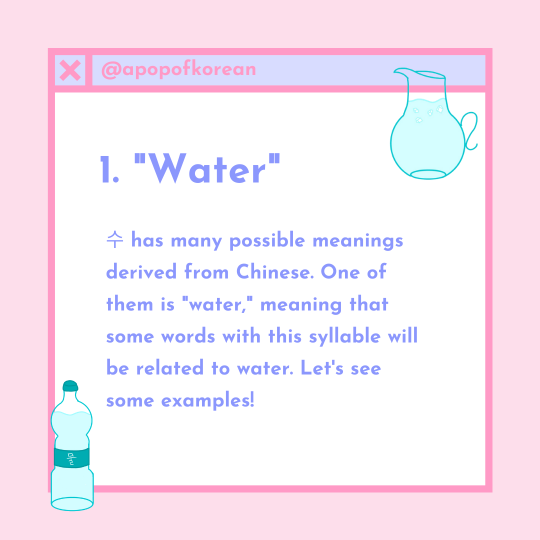
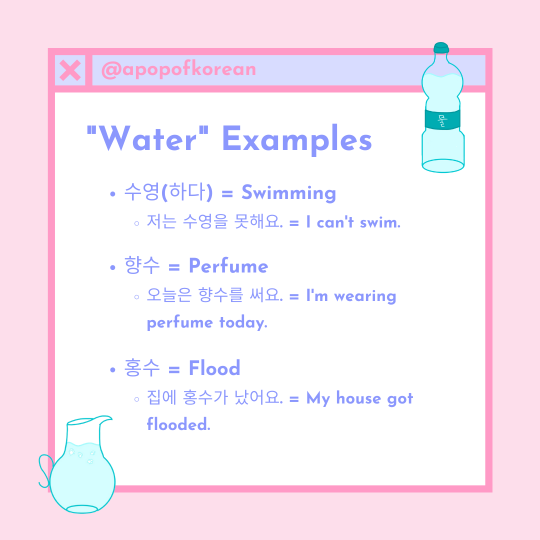

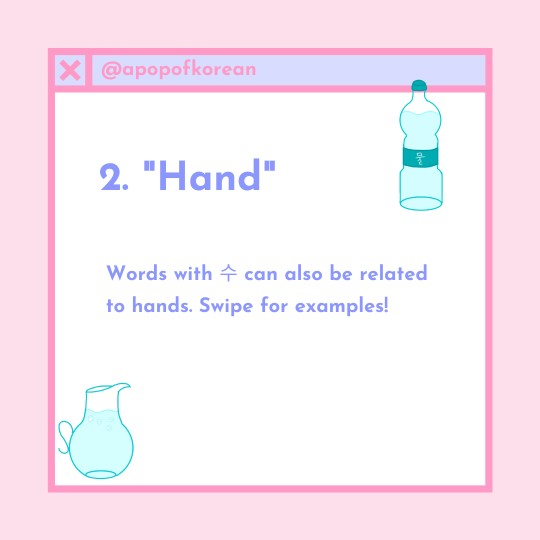
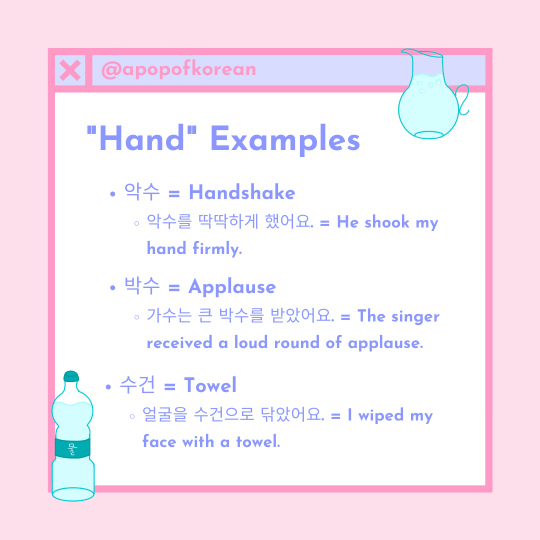
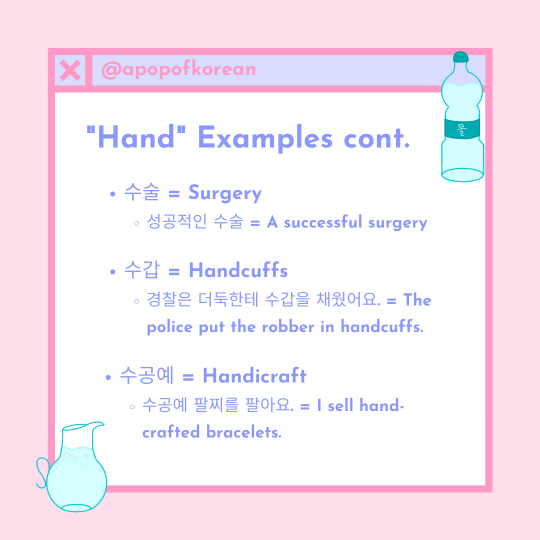

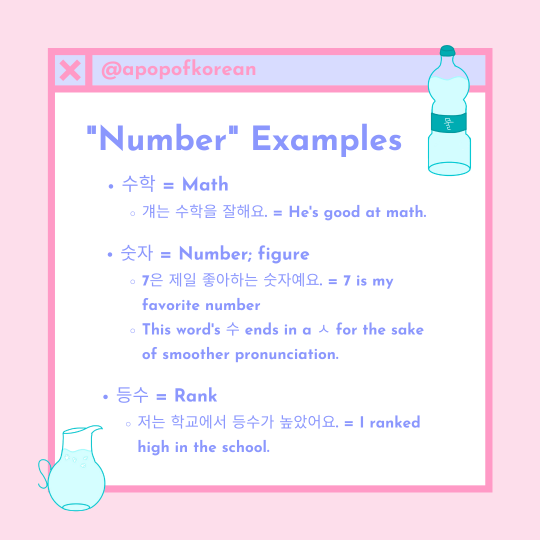
- My masterlist
- Joinmy Discord chat here to practice Korean with others!
- Follow me onInstagram herefor more Korean content!
- GetDrops Premium usingmy affiliate link to expand your Korean vocab!
- Check out myKo-Fito support this blog and my studies! Thank you for your generosity!
안녕하세요 여러분! Hey everyone! Today’s lesson is about -고 보니까, which is one way to express realization. Let’s start!
Use this formula:
- [verb stem] + 고 보니까 + [rest of sentence]
- The -까 can be dropped with no difference in meaning.
This structure is used to express your realization after you finish doing an action. Let’s look at an example:
- 한국어 수업을 듣고 보니까 꽤 어렵더라고요. = After taking a Korean class, I’ve realized that it’s quite difficult.
This sentence communicates your realization after you completed the action of taking a Korean class, that realization being that Korean is difficult to learn. I want to emphasize that this structure can only be used when talking about a completed action, not one that is currently in progress.
Notice that this structure is seen in sentences that have other endings communicating some sort of realization or surprise like 것 같다, -네요,and-더라고요. Let’s see some more examples!
- 책을 다 읽고 보니까 생각보다 재미있어요. = After reading the book, I see that it’s more interesting than I thought.
- 그러고 보니까 그 콘서트 표는 꽤 비싸네요. = Now that I think about it, that concert ticket it quite expensive.
- 그러고 보니 is a fixed expression meaning “now that I think about it” or “come to think of it.”
- 처음에는 김치를 싫었는데 다시 먹어보고 보니 괜찮더라고요. = At first, I didn’t like kimchi, but after trying it again, it’s okay.
- 원래는 걔가 좀 차가운 것 같지만 더 친해지보니 아주 착하네요. = Originally I thought she was a little cold, but now that I’ve gotten closer to her, she’s very nice.
That’s about it for this lesson! Lmk if you have any questions :) See you in the next one! 다음에 또 봐요!
- My masterlist
- Joinmy Discord chat here to practice Korean with others!
- Follow me onInstagram herefor more Korean content!
- GetDrops Premium using my affiliate link to expand your Korean vocab!
- Check out myKo-Fito support this blog and my studies! Thank you for your generosity!
감수하다 = to endure, to suffer without any protest
Usage
~을/를 감수하다
Expressions
고통을 감수하다 = to endure anguish
책임을 감수하다 = to bear the responsibility
비난을 감수하다 = to endure the criticism
볼이익을 감수하다 = to endure the disadvantages
Examples
많은 고통을 감수한 결과 오늘의 성공을 이루었다.
I achieved success today after enduring much pain.
내가 잘못을 저지른 이상 어떠한 비난이라도 감수하겠다.
As I have done wrong, I will endure all criticism and more.
감다 = to wind, to wrap, to rewind
Usage 1
~을/를 NOUN에 감다
~을/를 NOUN으로/로 감다
그는 다친 발목에 붕대를 칭칭 감고 있었다.
He was wrapping his injured ankle in bandages.
Usage 2
~을/를 NOUN에 감다
~을/를 NOUN으로/로 감다
두 사감은 서로의 허리에 팔을 감고 걸었다.
The 2 people wrapped their arms around each other’s waists as they walked.
그녀는 두 팔로 그의 목을 감았다.
She wrapped her arms around his neck.
Usage 3
~을/를 감다
비디오는 다 보시면 치음으로 감아서 반납해 주세요.
If you are finished watching the video, please rewind and then return it.
테이프를 처음으로 다시 감았나요?
Did you rewind the tape back to the beginning?
Synonyms
두르다 = to wrap
Antonyms
풀다 = to unravel, to unwind
가리다 = differentiate, be picky, be shy, be potty-trained
Usage
~을/를 가리다
1. To choose one option out of many different options
수많은 추품작 중에서 입상작을 10점만 가리는 것은 여간 어려운 일이 아니었다.
It was an extremely hard task to choose only 10 works out of all works entered.
말 좀 가려서 하세요.
Please be more careful about what you say.
2. To like only what you want to like and ignoring what you don’t like
음식을 가리지 말고 골고루 먹어라.
Do not be a picky eater and try to eat various types of food.
3. To choose to disassociate from strangers due to shyness
아이가 낯을 가려 엄마한테만 안긴다.
The child is shy and will only stay in its mother’s arms.
4. When a child is potty-trained and knows how to go to the bathroom alone
우리 조카는 두 살밖에 안됐는데 대소변을 다 가린다.
My niece is only two years old but has already been potty-trained.
가리다 = cover
To obscure something so that it is not visible or not penetrable.
Usage
~을/를 가리다
Expressions
나는 너무 무서워서 손으로 두 눈을 가려 버렸다.
I was so scared that I covered my eyes with my hands.
그는 모자고 얼굴을 가리고 나무 그늘에서 낮잠을 자고 있었다.
That person covered their face with their hat and slept underneath the shade of a tree.
Examples
짙은 안개가 내 시야를 가렸다.
The dense fog obscured my view.
어머니의 임종 소식에 눈물이 앞을 가렸다.
Tears covered my eyes as I heard the news of my mother’s death.
산 정상이 구름에 가려 있다.
Clouds cover the top of the mountain.
앞사람에 가려서 화면이 잘 안 보인다.
The person in front of me is blocking the screen so I can’t see well.
가르다 = divide, cut with a blade, split
To separate into different parts, cut something by using a blade, or divide or cut something by forcing it apart.
Usage 1
~을/를 ~으로/로 가르다
Examples 1
아이들이 편을 셋으로 갈라서 놀이를 했다.
The children decided to divide into three different teams and played.
나는 머리를 왼쪽으로 갈라.
I part my hair to the left.
Usage 2
~을/를 ~으로/로 가르다
Examples 2
생선의 배를 가르고 내장을 뺐다.
The fish’s stomach was cut in order to take out the innards.
사과를 둘로 가르다.
He slices the apple in two.
Usage 3
~을/를 가르다
Examples 3
화살이 과녁을 향하여 바람을 가르고 날아갔다.
The arrow split the air as it flew towards the target.
가라앉다= sink, settle, go under, subside
When an object floating on water sinks to the bottom or when wind or water currents become calmer.
Usages
~에 가라앉다
~으로/로 가라앉다
Expressions
배가 가라앉다
Ship sinks
열이 가라앉다
Fever goes down
흥분이 가라앉다
Excitement dies down
Examples
배는 큰 바위에 부딪힌 후 물 밑으로 가라앉았다.
After the ship ran into a large boulder, it sank to the bottom of the water.
경기 내내 계속되는 응원 열기 속에서 관중들의 흥분은 가라앉을 줄 몰랐다.
Even while cheering with fervor throughout the entire game, there was no sign of calming the audience’s excitement.
발목의 부기가 가라앉았다.
The swelling of my ankle has subsided.
배가 바다 밑으로 가라앉았다.
The boat sank to the bottom of the sea.
흥분이 쉽게 가라앉지 않았다.
The excitement didn’t calm down easily.
폭풍은 곧 가라앉을 것이다.
The storm will soon subside.
Vocabulary Focus
- 바닷가 = seaside
- 길가 = roadside
- 강가 = riverside
- 가게 = store
- 과일가게 = fruit store
- 구멍가게 = hole-in-the-wall store**
- 가다 = to go
- 걸어가다 = to go by walking
- 들어가다 = to enter/go in
**구멍가게 is rarely used and has lowly/humble connotations so 작은 가게 is preferred usually
Grammar Highlights
~고 Connector
- Basically indicates that 1 action occurs and then another
- Adding 나서 after ~고 stresses doing one action after the previously mentioned action
- Connects similar ideas
- Connects adjectives
- 1st verb connected to ~고 is only conjugated if (1) when 1 action occurs after another with considerable time between the 2 actions and the 1st action leads to the 2nd action’s possibility; and (2) when connecting clauses with similar ideas happened in the past with no real indication of action order
- Using 는/은 can compare 2 nouns in ~고 sentences
- ~고 싶다 is connected to verbs to mean “I want to…” – remember 싶다 conjugates as an adjective
- ~고 있다 denotes being in the process of getting into a state or position literally right now (i.e. 나는 앉고 있어 “I am literally in the process of bending my knees to sit down” vs. 나는 앉아 있어 “I am sitting”)
Sentences
저 과일가게에서 딸기를 사고 딸기는 간식으로 먹어요.
제 친구는 이 작은 가게에 들어가고 싶지만 문이 잠겨 있어요.
저는 바닷가를 걷고 있어요.
길가에서 제 차가 고장나 연기를 피웠어요.
우리는 강가를 걸은뒤 낚시를 할 거예요.
우리는 강가를 걸은뒤 낚시를 할 거예요.
저는 과일가게에서 쇼핑을 하고 나서 집으로 갈 거예요.
당신이 열심히 공부한다면 좋은 대학에 들어갈 거예요.
저는 돈이 많지 않아 구멍가게에서 식료품을 사고 싶어요.
저는 방학 동안 바닷가에 갔고 강가에 갔어요.
저는 열심히 공부했고 교직에 들어갔어요.
Hi, it’s been a long time since I posted here and decided to be active again. As of the moment, I can’t think of any korean related lesson to post. Any suggestions? :)
anon asked: I just finished reading your most recent blog and im just confused about something. you give us the translation for boda and bo-eda but why do I sometimes see a different verb beside boda? like meokeoboda? Sorry about the romanization, i dont have a korean keyboard on my phone
Hey! It’s not a problem! If you need help figuring out how to add a keyboard to your phone, it’s simpler than you think! Just go the “keyboard” function in your settings then press “add new keyboard” you should see “Korean” or 한국어.
As for your question, I’m going to assume you’re talking about 어/아/여 보다! If I’m not assuming correctly, then please send me another pm or comment on this blog! Hopefully my assumption is correct though!
V ~ 어/아 /여 보다; try, suggest/order (imperative / attempt; 시도)

Conjugate the stem, then add 보다. Not much else to it!
If we attach ~(으)시다 to the grammar point, then we make it a more formal imperative. But if you use intimate style (반말) with your friends, then conjugating 보다 regularly is fine. Here are some formal examples:
- 치마를 입어 보세요 - Try the skirt on
- 잘 생각해 보세요 - think about it well
- 식혜를 마셔 보세요 - try sikhye (Korean rice drink)
Intimate Style:
Sometimes my Korean friends have a hard time saying something in English, and I have a hard time understanding. Usually when this happens, I say, “한국말로 해 봐” which literally just means, “say it in Korean”. If you’re someone who finds it a bit easier to speak informally (like most learners, lol), then here are some other sentences you can use:
When NCT drops another bop and you’re desperate to share it with your friend, say: 잘 들어 봐 - listen well
When your friend is talking too fast in Korean and you can’t keep up, say: 야. 천천히 말해 봐 - yo, speak slower
When your friend has a big test coming up and you wanna support them, say: 공부 열심히 해 봐! 파이팅 - study hard! fighting
V ~ 어/아/여 보다 + 과거 = 어/아/여 봤어요; have tried (experience; 경험)
Here’s where it get’s interesting! If you conjugate 보다 in the past tense when attached to a verb, it talks about past experience. However, this is a very specific example that has happened in the past (usually a distant past, not one that happened recently). Here are some examples:
- 한국에 가 봤어요 - I’ve been to Korea
- 감자탕 먹어 봤어요 - I’ve tried gamjatang (Pork Bone Stew)
- 어렸을 때 미국에 살아 봤어요 - I lived in the US when I was young
If you want to ask someone if they’ve ever done something, or tried something, then just add a question mark!
- 감자탕 먹어 봤어요? - have you ever tried gamjatang?
- 노래방에 가 봤어요? - have you ever been to karaoke?
- 스키 타 봤어요? - have you ever been skiing?
If you want to say that you haven’t done the thing that they’re asking, then add 안 before the main verb. EX. 아니요. 감자탕 “안” 먹어 봤어요 - No. I haven’t tried gamjatang. You can also use “못” instead of “안”. I have used both in the same context and it means the same thing!
V ~ (보다) + (으)ㄴ 적(이) 있다/없다 = have done V / haven’t done V (experience; 경험)
Another way to express experience in the past with / without 보다 is (으)ㄴ 적(이) 있다/없다. 적 is a dependent noun related to time! Here are some examples:
- 떡볶이 먹은 적이 있어요 - I’ve eaten tteokbokki (Korean spicy rice cake)
- 서울에 산* 적이 없어요 - I have never lived in Seoul!
With 보다:
- 소주 마셔 본 적이 있어요 - I’ve tried soju
- 한복 입어 본 적이 없어요 - I haven’t tried wearing a Hanbok!
*살다 (to live) is an irregular ㄹ verb, therefore ㄹ acts as a vowel/is omitted in most grammatical instances. Other irregular ㄹ verbs you may know: 만들다 (to make), 알다 (to know), 울다 (to cry), 열다 (to open), 팔다 (to sell), many more!
When saying that you’ve watched something, or haven’t while using 보다 in the sense of “to see”, you wouldn’t say 봐 봤어요 or 봐 본 적–, it’s just grammatically incorrect and honestly, unnatural sounding. You would just say 본 적 or 봤어요. The Korean person you’re talking to will understand the context instantly. Here are some examples to illustrate this:
- 영화 기생충 봤어요(?) - Have you seen/I have seen “Parasite”(?)
- 드라마 알랑말랑 본 적이 있어요 - I’ve watched the drama “알랑말랑”
Hope that answers your question! I would say this grammar point is maybe A2-B1! Pretty easy and once you get it, you’ll start to understand some more intermediate sentences a lot better! If you’re still confused, or, again, I assumed wrong, then don’t hesitate to send me another message/pm! I’ll help you right away!
Happy Learning :)
~ SK101
learn korean
hi i previously made a post about learning korean the “lazy way” so i was thinking about making one about the “cute way”
what do u think??? do u want me to make the post? pls lemme know!!
